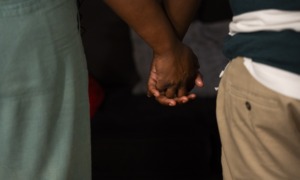A Leary View Of Youth Voting
As another presidential election year opens, what this country needs is … another campaign to get young people to vote?
Norman Lear thinks so. The 81-year-old television producer kicked off his new voting initiative, Declare Yourself, in Washington in November, promising $27 million and lots of celebrities to sell youth and young adults on voting and civic engagement.
The effort is to include a video starring Ben Stiller and Vince Vaughn, with cartoons by the animators from “South Park,” promoting the idea that voting is cool. Lear’s group pledges to distribute the video to 1 million high schools, where most youth are too young to vote. But armed with a survey that says most voters ages 25 to 29 registered to vote when they were 18, Lear says the objective is to instill in teens the idea that they should register and vote as soon as they are allowed.
There will also be tours of college campuses, a website with information about the major party candidates and voter registration, and lots of event designed to inspire youth.
The “All in the Family” producer has put up some of his own money and received donations from Yahoo! and Home Depot, among others. The organization’s list of partners includes the YMCA of the USA, Vibe magazine and the American Association of State Colleges and Universities.
Declare Yourself joins groups such as YouthVote, Rock the Vote and Kids Voting USA (another partner) in what has been a rather frustrating effort, at least on the national level. The rate of voting among 18- to 24-year-olds has been declining since the national voting age was lowered to 18 in 1972. It dropped to 32 percent in 2000.
Contact: www.declareyourself.com.
Kids Go to Polls
It doesn’t count officially, but 250,000 youths went to the polls in November to vote for local candidates and propositions. The voting drive was a project of Kids Voting USA, the Tempe, Ariz.-based civic engagement program that teaches the value of political participation.
Now in its 12th year, Kids Voting USA partners with local voting officials to help youth join their parents at polling places and cast their own paper ballots in separate booths.
“One of our goals is to engage students as early as possible in understanding their role in the political process, how they can impact that process and how to take action,” said Kids Voting spokeswoman Paula Case.
Although there were exceptions, this year’s youth votes closely mirrored adult votes. In Kentucky, for instance, 65 percent of the youth cast their ballots to end the Democrats’ 32-year reign in the governor’s office, choosing Republican Ernie Fletcher. Fletcher won 55 percent of the adult vote.
Kids Voting USA publishes a K-12 curriculum that can be downloaded from its website. Contact: (480) 921-3727, www.kidsvotingusa.org.
Antidepressants And Suicide
Anyone working with kids who are taking antidepressants should be aware of the growing concern that the drugs might increase the risk of teen suicide.
The U.S. Food and Drug Administration (FDA) recently cautioned doctors about treating adolescents and children with antidepressants, following evidence of increased suicidal tendencies among youth who use them.
The FDA issued a health advisory based on studies of eight antidepressants used by youth with major depression disorder (MDD).
While suicidal thoughts and attempts are common in MDD patients, says the advisory, the preliminary data from trials involving 4,100 pediatric patients indicate an “excess” of such cases among those treated with antidepressants compared with those given placebos.
The warning comes months after British health regulators warned doctors last summer against using the antidepressant Paxil to treat depression in patients under 18. Data from a British study indicated an increased risk of suicidal thinking among adolescents treated with Paxil.
The FDA issued an advisory in June to health care officials to use caution when prescribing Paxil to treat depression in children and adolescents. Paxil is approved for use by adults for a variety of ailments, including MDD, and there is no indication that adults using Paxil have a higher risk of suicide.
With few established treatment options for pediatric patients, doctors often rely on adult antidepressants, even though only one, Prozac, has been proven effective for use by youth. The failure of other drugs to show effectiveness in trials does not indicate that those drugs are ineffective, because there can be many reasons for failures in trials.
Contact: FDA at (888) 463-6332, www.fda.gov/cder/drug/advisory/mdd.htm.
Former Justice Official Cleared in Sex Case
After a second trial, Kentucky’s former juvenile justice commissioner was acquitted of all charges involving groping a young man in a New York hotel room.
Ralph Kelly, who was dismissed last year when the charges surfaced, was found innocent in November by a New York jury of misdemeanor charges of forcible touching and third-degree sex abuse. During the first trial, which ended in a hung jury, the man making the charge said Kelly shared a marijuana cigarette with him.
“I always said the charges were not true,” said Kelly, who still nurses discontent about the state’s rapid decision to sack him. “I will try to restore my excellent reputation as best I can.”
Kelly chairs the American Corrections Association’s National Task Force on Juvenile Facility Size.
“I travel around the country. I will probably do some consulting work, and I’m open for offers,” Kelly said.
Smoking Beached By Teen Activists
Burned out from feeling as if they were walking in an ashtray rather than on the beach, 10 members of the Youth Tobacco Prevention Corp. successfully lobbied Solana Beach City Council in California to ban smoking on the city’s 1.4 miles of beaches.
The ban, which tells smokers to refrain from lighting up out of courtesy for their fellow beach-goers, evolved after the group of teens collected more than 6,000 cigarette butts in just over one hour of cleaning a beach in the city of Encinitas.
The city council there rejected the youths’ request to ban smoking on Encinitas’ beaches. But nearby Solana Beach agreed with their request to declare September smoke-free for local beaches and city parks.
At the end of September they asked that the ban be made permanent, and the council agreed. First offenders can be fined $100.
“I think the important thing here is that this group of high school students came down and talked to the city council, and we responded to them positively, and I would hope that from this, teenagers would see that they can, in fact, make a difference,” said Mayor Tom Golich. “They always talk about people under 30 not voting, and I believe very strongly that getting kids involved in issues like this motivates them to be more politically involved later in life.”
“We are very much a beach city, and the kids go to the beach as much as the park,” he continued. “Maybe if they go to this beach and see that people aren’t smoking, then they won’t as readily think that it is cool.”
The mayor said that helping to curtail youth smoking will more than offset the mail he has received accusing him of being “a Nazi.”
Briefly…
Dirty Cell Phones: A national YMCA advisory about the potential inappropriate use of cell phones equipped with video imaging prompted Dan Foley, vice president of the YMCA of Dane County, Wis., to ban the phones from YMCA premises. The county-wide rule, which took effect in early November, is intended to protect members from being unknowingly photographed at YMCA facilities, particularly in locker rooms and showers.
The ban has been well received by most YMCA patrons, largely because of overall annoyance about cell phones, said national spokeswoman Julie Mulzoff.
“Many YMCAs already have cell phone bans in effect, just like many restaurants do, just out of courtesy for other members,” she said.
Juvenile Courts Open: Answering concerns that Utah’s juvenile court system was too secretive and overbearing in handling child protection cases, the state announced in November that child welfare cases in two of its districts will be opened to the public. While there is some concern about children’s privacy, supporters of the policy point out that the public will not have access to the children’s files, which contain sensitive records. The policy will go statewide in 2005, unless the state Legislature moves to stop it.
Think About Mom: The Advertising Council, the U.S. Department of Justice and the National Crime Prevention Council hope that thinking about grieving mothers will keep some youths from picking up guns. The three agencies have teamed up on new advertisements showing the effects of gun violence on family members, using interviews with gang members and other criminals who say they would have thought twice about using a gun if they had known how it would affect their mothers. And if that doesn’t work …
Mom Busted Over Toy Gun: A 9-year-old Ohio boy was arrested at gun-point in late October on charges of juvenile delinquency and inducing panic after he waved a plastic toy gun over his head while sitting on a city bench in Lorain. The boy, who told police his gun was a toy, will not face criminal charges, but his mother will. She was charged with obstruction of justice after she ran out of a nearby hair salon and pleaded with an officer to uncuff her son and let him off with a warning. She faces up to 270 days in jail and a $2,250 fine.
Medicaid Freeze: In an effort to preserve children’s health insurance programs in the face of budget restraints, five states have frozen enrollment and created waiting lists for children who are not covered by Medicaid and whose parents do not make enough money to afford private insurance. The freeze by Alabama, Colorado, Florida, Montana and Utah allows them to keep providing health insurance to children enrolled in the program without altering their eligibility rules.
Tobacco Use Drops: The percentage of high school students who reported using tobacco dropped to 28.4 percent in 2002, down from 34 percent in 2000, according to data released in November by the U.S. Centers for Disease Control. There was no significant decrease among middle school students. Anti-tobacco advocates suggest that younger youth are not affected by fiscal policies that increase cigarette taxes and prices, because they purchase cigarettes from commercial vendors less frequently than do older youth.
National Youth Summit: More than 950 youths and adults attended the second National Youth Summit sponsored by the U.S. Family and Youth Services Bureau Nov. 6-8 in Washington. Teens on the summit’s youth planning committee helped to create and moderate the workshops, which focused on youth community involvement. Youths also served on the workshop panels, which covered topics such as community service, youth development in businesses and abstinence education. Youth panelists included Gregory Smith, founder of International Youth Advocates, and members of the Girls Scouts, Jobs for America’s Graduates and the National Youth Sports Program.
Sex Offenders Lost: One-third of Massachusetts’ sex offenders have evaded the state’s sex-offender registry law by providing phony or outdated home and work addresses, according to the Boston Herald. The law was designed to help people find out if convicted sex offenders are living in their neighborhoods. Police lament that they do not have enough manpower to keep track of the state’s 1,025 sex offenders or enough bulletin board space to post their photographs.
Game Inspired Violence? The family of Aaron Hamel, who was shot to death in June by two teenagers while he was driving on a highway, has filed a lawsuit in Tennessee’s Cocke County Circuit Court against Rockstar Games, the maker of the video game “Grand Theft Auto III.” The family is seeking $246 million in damages, based on the shooters’ statements to authorities that the game inspired them to shoot at cars.
Staff Tragedies Counselor Killed, Boys Charged
A counselor at a residential center for troubled juveniles was murdered on the job in November, and two male teens under his care have been charged with killing him.
The body of Wayne Lamont Urey Jr. was discovered in one of the houses at George Junior Republic, a private treatment facility in Grove City, Pa., with a bed sheet tied around his head and neck. Urey’s hands were tied with sheets and his legs with a belt.
The 480 boys at the center live in 60 ranch-style houses, which are supervised by live-in married couples. Executive Director Rick Losasso said Urey, who had worked there for more than 13 years, was supervising youths in one of those houses on an evening shift while the married couple was off duty.
The facility accepts youth from 10 states, mostly through court referrals but also from families, who pay tuition. The youth at George Junior have not been convicted of violent offenses, Losasso said.
Initial reports painted the incident as part of an escape by two boys, although Losasso said the 400-acre campus is not fenced.
Court documents cited by the Pittsburgh Tribune-Review said other juveniles at the center told police the two boys, ages 16 and 17, had talked about escaping and invited other boys from their house to join them.
Each worker at the center has a panic button connected to a 24-hour switchboard that monitors the security systems and sends help if needed. The center purchased the buttons after one of its counselors was raped in 1999, according to the Pittsburgh Post-Gazette. The paper said Urey left his panic button on a desk outside the bedroom where he was assaulted.
The boys allegedly drove away in Urey’s pickup truck. Police say they found them parked outside a vocational school. They were charged with criminal homicide, robbery, theft, aggravated assault, escape and criminal conspiracy.
According to the center’s website, philanthropist William Ruben George created George Junior in 1909 to help boys ages 8 to 18 who were delinquent or in need of treatment.
“We try to balance safety and security with treatment and rehabilitation,” Losasso said. He said George Junior has 600 staff members, with more than 80 youth workers on duty each night.
The center offers emotional and substance abuse counseling, education, and recreational activities such as swimming and horseback riding.
A somewhat similar attack occurred at another residential school in February 2002, when eight teenage girls assaulted a night supervisor at the Pleasantville Cottage School in Mount Pleasant, N.Y. The girls, who had been referred to the school by social agencies, took turns beating the counselor with a phone, cut her hair, pushed her down two flights of stairs, poured rubbing alcohol and bleach on her and lit her on fire.
In that case, the counselor was not supposed to be on duty alone. The school has hired more staff for round-the-clock security, increased patrols of the cottages and instituted an hourly check-in system for counselors at the cottages.
Staffer Charged in Attack on Youth
For the second time in two years, sodomy charges against an adult youth worker have racked the residential treatment center at Children’s Village in Dobbs Ferry, N.Y.
Police say that in a November attack, assistant cottage counselor Jason Brown held down a 14-year-old boy while a 16-year-old resident sodomized him with a broomstick. The victim resided in one of the 22 cottages on the 150-acre site, which houses 300 troubled, abused and neglected boys.
The victim had been chased and cornered in a shower room during a weekday evening, said the police, who offered no motive for the attack. The boy reported the incident the following morning. He was treated for abrasions and released from a hospital.
Brown and his alleged juvenile accomplice were charged with first-degree aggravated sexual abuse, a felony punishable by up to 25 years in prison. While Brown is out on $50,000 bail, the juvenile has been remanded to a facility in nearby Valhalla.
“The trauma, the long-term effects on the victim, is simply not measurable, especially to a 14-year-old,” Westchester County District Attorney Jeanine F. Pirro told The New York Times.
Brown’s father has publicly stated that his son is “innocent of all charges.”
Brown was a child caseworker at Children’s Village from 1992 until 1997, according to Linda Stutz, the agency’s vice president for development and community relations. He landed an assignment last June as an assistant supervisor at Wolfe Cottage, the site of the attack.
Stutz told the Times that Brown had been subjected to a background check that showed no criminal record or history of problems of concern to a youth agency.
Nancy Travers, deputy commissioner of Westchester County’s Department of Social Services (DSS), said her agency was freezing child referrals to Children’s Village, one of the largest residential treatment centers in the country. It was founded in 1851 as an orphanage for New York City’s poor.
A team of social workers began counseling youth at the home soon after the incident, Stutz said. She added that an internal “root cause analysis” was launched the week after the incident to examine “what systems may have been involved in this happening.” DSS may resume referrals to Children’s Village, pending the results of the analysis, Stutz said.
“We go to great lengths to create a community in which everyone works hard to keep the children safe,” Stutz said. “Our priority is to help the children deal with this.”
In March 2001, Pirro’s office filed a 41-count indictment against a volunteer mentor at Children’s Village for allegedly sodomizing several children over at least four years. Samuel Toffel, 63, pleaded guilty to three counts of first-degree sodomy and two counts of endangering the welfare of a child and was sentenced to 10 years in prison. The charges involved children ranging in age from 7 to 15, including the 7-year-old brother of one of the children he mentored, but it is not clear if any of the victims were from Children’s Village. The crimes occurred in Toffel’s home.
Contact: Westchester District Attorney (914) 995-3586; Children’s Village (914) 693-0600, www.childrensvillage.org.































